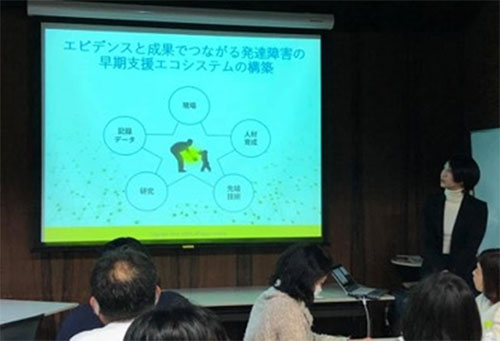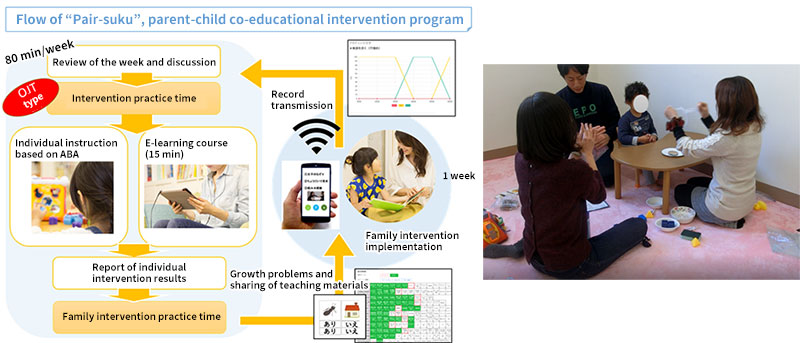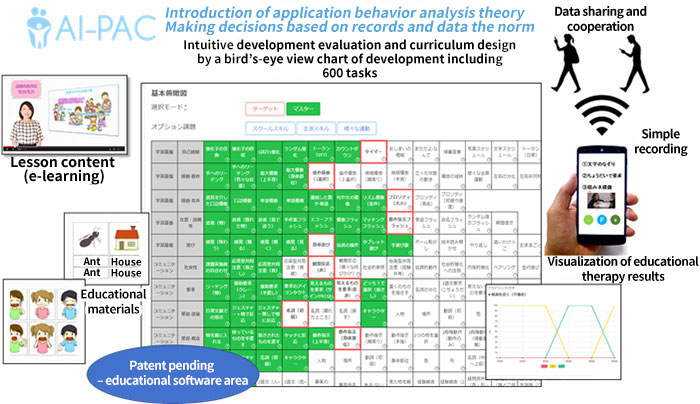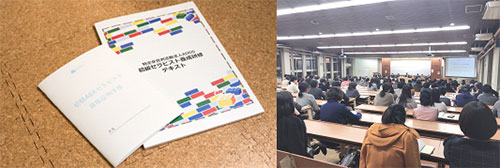Research Results
Evidence-based establishment, implementation, and development of human resources
Nationwide early intervention for children with developmental disabilities and support for parents by utilizing ICTFY2021

- Kuma Hitomi (co-representative of ADDS, a specified non-profit organization)
- RISTEX Implementation-Support Program (Call for proposal Type)
- Evidence-based implementation of an early habilitation model for children with developmental disabilities working with parents (2016-2019)
Developed parent-child co-intervention program utilizing ICT and confirmed its effectiveness
Kuma Hitomi, who is in charge of the R&D implementation support program, has developed an early development support application "AI-PAC" for children with developmental disabilities based on Applied Behavior Analysis (ABA). The early intervention program "Pair-suku" utilizing "AI-PAC" is being implemented at 15 child development support facilities nationwide. As a result, we supported 344 families in three years.
"AI-PAC" is a system that can comprehensively evaluate the development of children and formulate and record support plans. The system has been extended beyond its original goals, leading to the filing of trademark and patent applications. "Pair-suku" is a short-term early behavioral intervention program focusing on the utilization of ICT and co-education support for parents and children, and participants receive a quantitative evaluation.
In April 2020, this project was implemented at the first public child development support center in Edogawa Ward, laying the foundation for establishing and disseminating a best practice model based on local governments.
After packaging the implementation mechanism with support content and set price and recruiting participating organizations, many organizations want to implement it for a fee and have already started implementation. Through these efforts, financial independence and the sustainability of the system have been demonstrated. We are also working on human resource development, such as establishing a qualification system.

Fig. 1 Implementation briefing session

Fig. 2 Early habilitation program "Pair-suku"
Proper care opens up possibilities
According to a survey by the Ministry of Education, Culture, Sports, Science and Technology in 2012, about 6.5% of children in public elementary and junior high schools nationwide have developmental disabilities such as autism. However, in Japan, there is a lack of accurate information on developmental disabilities, and there is an overwhelming shortage of support personnel and facilities.
Autism is a congenital brain dysfunction, and various studies have shown that providing appropriate intervention from an early stage can improve some of the symptoms.
In Japan as well, the need for early detection and early support for developmental disorders is increasing. This project, in collaboration with developmental support organizations, establishes and disseminates a regional model of evidence-based early intervention nationwide to create a society in which parents and children receive early support and the potential of their children is maximized.
Implemented at 15 bases, supporting 344 families
"AI-PAC" is equipped with an overall development map consisting of about 600 tasks, basic functions that allow users to select tasks and create record sheets, and a function to record task results on a tablet or smartphone. As a result, trends in task accuracy rate can be graphed, and supporters and parents can objectively grasp the development support process of each child. In addition, task data can be stored in a database, enabling effective support such as sharing with parents and remote supervision *1.
As a result of implementing "AI-PAC" and "Pair-suku" at 15 facilities nationwide and supporting a stable operation system, we were able to support 344 families in three years. In addition to the originally planned preschooler support facility, we were able to implement it in facilities and schools that support school-aged children. This result suggests the possibility of expanding this project to various age groups and facilities.
Various evaluations showed that for parents and children who participated in "Pair-suku", the children had a significantly higher score in developmental tests for language, society, cognition, adaptation, and communication compared to the children who did not participate. In addition, parents who participated in "Pair-suku" indicated in a questionnaire that they have a higher level of confidence in the relationship with their children than those who did not participate.
This project is being carried out at the "Edogawa Ward Development Support Center" in Edogawa Ward, Tokyo, and is actively working on early detection and support for developmental disorders. Here, we aim to establish a best practice model for local governments that covers everything from early detection to effective early intervention.
To develop human resources we designed a training course for novice ABA therapists, consisting of 20 credits for knowledge learning and 20 credits for hands-on training, and trained 51 novice ABA therapists.
*1 Supervision A system where a supervisor who is familiar with applied behavior analysis and developmental psychology and has more than 10 years of clinical experience in task composition and support procedures gives parental support based on the individual characteristics and developmental stages of children.

Fig. 3 IT-based educational therapy curriculum, "AI-PAC ONLINE"

Fig. 4 Beginner ABA therapist training textbook and training session
For learning and development platforms
In the future, an evidence-based development support network (EDS-NET) will be established to further strengthen cooperation with implementing organizations. We will increase the number of implementation bases, ensure financial independence and sustainability at each base, and strengthen support for children with developmental disabilities and their families.
To that end, we will conduct follow-up research on support using "Pair-suku" and "AI-PAC", evaluate the long-term support system and its effects, and promote information dissemination and human resource development. The results and discoveries gained through these activities will be published as policy recommendations.
Initially, "AI-PAC" was intended to be used only as a support tool in the field, but since it can record the developmental support process in clinical situations, it is possible to accumulate data on developmental cases. For "AI-PAC", as a result of conducting a trend analysis of the developmental support process in collaboration with Mitsubishi UFJ Research & Consulting, it was found that the areas to be tackled tend to differ depending on the profile of the child. In the future, we will convert it into "big data for learning and development" and start research on development as a data storage platform.
